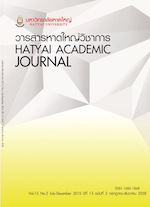การจัดกระบวนการเรียนรู้แบบโฮมสคูล: กรณีศึกษาครอบครัวในภาคใต้
Main Article Content
Abstract
Home Schooling’s Learning Process Management: A Case Study of Families in the South
The objective of this qualitative research was to investigate home schooling’s learning process management organized by home schooling families in the South. Participants were four home schooling families at a basic education recruited by using the purposive sampling. Twenty-four key informants of this study were guardians, homeschoolers and teachers. The data were analyzed by using content analysis. The findings revealed that the families chose 2 types of curriculum; the Basic Education Curriculum 2001 and international curriculum of home schooling corresponding students’ interest and families’ concept and lifestyle. Next, Families showed 2 types of learning and instructional method; mixed method of eight subjects group and experience based learning, and experienced based learning. Four Home Schooling families similarly applied the experience based learning but slightly different in techniques and proportion in educational management of each family. In addition, the family must be an active learner with the students at the same time and each learning process can flexibly be adapted. Families worthily used both internal and external media and leaning resources based on student’s age and needs. Parents were counted as the most important learning resource in all families. Lastly, the families emphasized authentic assessment based on mutual understanding of family members and all parties in charge.
Article Details
All published articles are evaluated by three qualified peer reviewers from various institutions through a double-blind process, where reviewers do not know the authors’ identities and authors do not know the reviewers’ identities. The content and articles in the Hatyai Academic Journal reflect the authors’ views only and are neither the opinions of the editorial board nor the responsibility of Hatyai University. The Editorial Board of the Hatyai Academic Journal allows articles to be reproduced for academic purposes, on the condition that the original source is clearly cited.


